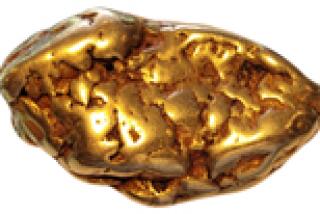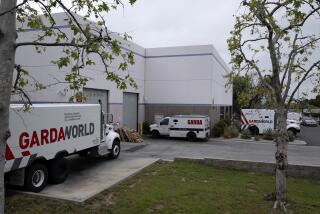Mysterious Millions Stir a Courtroom Gold Rush
- Share via
SAN FRANCISCO — Ann Kamali always thought it was too good to be true, and maybe it was.
When Kamali and fellow Budget Rent-a-Car employee Nelson Garrett opened the trunk of an abandoned car at San Francisco International Airport last fall, they found $6 million stashed inside-- and figured that it might be theirs if no one claimed it.
Well, someone has. Several people, in fact--although that should come as no surprise.
The leading candidate for getting the trunk full of treasure also should come as no surprise. It is the U.S. government.
All of the claimants were in federal court here Friday arguing their case.
Clues Pose Mystery
But the case is far from over. Still unclear are the importance of several clues, or red herrings, worthy of a ripping good mystery yarn--a vanishing cardboard box, for example, and a mysterious small valise.
Most curious of all is the primary question: Who left $5.6 million in cash, $158,000 in Canadian gold coins and 500 bars of the precious metal platinum in the trunk of a 1984 white Ford Tempo? And why?
Assistant U.S. Atty. Dennis M. Nerney argued in U.S. District Court here on Friday that the treasure was part of a huge cocaine deal gone bad, and that as such the loot must be confiscated.
As evidence of his theory, he cited cocaine traces in one of five suitcases and in duffel bags in which the money was found. U.S. District Judge Samuel Conti has kept other evidence--including a key affidavit--secret because of a continuing investigation.
But Kamali and Garrett and five other claimants--including Budget Rent-a-Car Corp. and two agencies of the state of California--asked Conti to let them quiz government agents and try to prove that drugs were not involved.
Missing Box at Issue
Among other things, they want to know what happened to a cardboard box that Kamali and Garrett remember seeing in the trunk.
One of their lawyers, Michele Jackson, said the box held the gold coins and platinum ingots. Those valuables now are stored by the government in a valise that she said was not originally there.
Another lawyer, Frederick P. Furth, said that it was “totally unreasonable” for the government to seek ownership of the booty chiefly on the basis of a secret affidavit, even though he has had a chance to read it.
Nerney, the government lawyer, declined to discuss specifics in the case.
Conti took the case under submission after a hearing, but did not say when he will rule on the request.
None of the people seeking the money claim to be the original owner.
Federal drug agents have said they believe they know who that would be--the car reportedly was rented by a Florida man--but they will not elaborate until they finish their investigation.
State Law Cited
Kamali and Garrett said the money belongs to them because they saw it first--when they opened one of the duffel bags while removing luggage from the trunk after Kamali retrieved the abandoned vehicle from the airport.
Like the other individual claimants, they cite California law allowing the finder of lost property to keep it if, after they give public notice, no one claims it within 90 days.
Douglas Stavoe, another Budget employee, claims the money because he says he is the one who noticed that the car had been parked at the airport for an unusually long time.
Pearl Lampost, a security guard working for Budget, says the money is hers because she had asked a Budget employee to open the trunk at one point and saw the loot inside.
Budget is seeking the money because it was found in one of its cars.
The state Franchise Tax Board has asked for some of the money based on the idea it is the fruit of a crime--and as the board’s chief counsel, Glenn Rigby, said: “Under California law, even illegal activity is subject to tax.”
The state controller’s office, too, wants to collect the loot because it is the legal guardian of abandoned property.
Government Not Amused
Despite its somewhat comic tone, this courtroom gold rush is something less than funny to the federal government.
“They (the claimants) could show perhaps that it was someone’s inheritance or that someone sold some land and then forgot about the money,” Nerney said. “But they haven’t.
“We’ve proven what we need to prove under the law” to convince the court that the money was intended to finance a drug deal, he said, “and they have no business interfering in an ongoing criminal investigation.”
More to Read
Sign up for Essential California
The most important California stories and recommendations in your inbox every morning.
You may occasionally receive promotional content from the Los Angeles Times.













